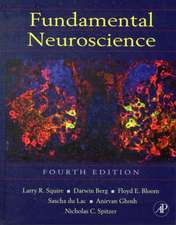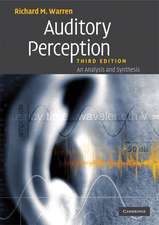Neuropsychological Formulation: A Clinical Casebook
Editat de Jamie A.B. Macnivenen Limba Engleză Hardback – 17 sep 2015
Included among the topics:
- The interface of neuroimaging with neuropsychological findings in traumatic brain injury.
- Neuropsychological aspects of temporal-lobe epilepsy: seeking evidence-based practice.
- An integrative approach to differential diagnosis of subarachnoid hemorrhage and Korsakoff’s dementia.
- Educational disengagement following mild TBI in childhood.
- Themes in the formulation of repeat assessments.
- Cognitive neuropsychological formulation.
Formulation is essential in good neuropsychological assessment as it provides the foundation for appropriate intervention by bringi
ng together the results of different evaluations into a coherent whole. . . . Macniven’s compelling and constructive book has assembled internationally known experts from diverse backgrounds to provide illumination of their own views and approaches to formulation, which makes the book a pleasure to read and should establish it as essential reading on clinical psychology and neuropsychology training courses. – Professor Barbara A. Wilson OBE, Ph.D.,D.Sc. Neuropsychologists, clinical psychologists, and rehabilitation specialists will find Neuropsychological Formulation of critical importance not only to the literature of the field, but also to the developing role of clinical neuropsychology within healthcare systems.
| Toate formatele și edițiile | Preț | Express |
|---|---|---|
| Paperback (1) | 695.01 lei 6-8 săpt. | |
| Springer International Publishing – 23 aug 2016 | 695.01 lei 6-8 săpt. | |
| Hardback (1) | 948.79 lei 6-8 săpt. | |
| Springer International Publishing – 17 sep 2015 | 948.79 lei 6-8 săpt. |
Preț: 948.79 lei
Preț vechi: 1157.06 lei
-18% Nou
Puncte Express: 1423
Preț estimativ în valută:
181.55€ • 189.18$ • 150.32£
181.55€ • 189.18$ • 150.32£
Carte tipărită la comandă
Livrare economică 03-17 aprilie
Preluare comenzi: 021 569.72.76
Specificații
ISBN-13: 9783319183374
ISBN-10: 3319183370
Pagini: 280
Ilustrații: X, 246 p.
Dimensiuni: 155 x 235 x 19 mm
Greutate: 0.54 kg
Ediția:1st ed. 2016
Editura: Springer International Publishing
Colecția Springer
Locul publicării:Cham, Switzerland
ISBN-10: 3319183370
Pagini: 280
Ilustrații: X, 246 p.
Dimensiuni: 155 x 235 x 19 mm
Greutate: 0.54 kg
Ediția:1st ed. 2016
Editura: Springer International Publishing
Colecția Springer
Locul publicării:Cham, Switzerland
Public țintă
Professional/practitionerCuprins
Part I: Introduction.- Part II: An Overview of Integrated Health Care and the Patient-Centered Medical Home.- Integrated Care and Specialty Behavioral Health Care in the Patient Centered Medical Home.- Blending Behaviorists Into the Patient-Centered Medical Home.- Training the Behavioral Health Workforce for the Patient-Centered Medical Home.- The Patient-Centered Medical Home (PCMH) Model within an Integrated Primary Care System: Towards a European Model?.- The Importance of Stepped Care Protocols for the Redesign of Behavioral Health Care in Patient Centered Medical Homes.- Planning a cost-effectiveness study.- Part III: Specific Applications of Behavior Health in the Patient-Centered Medical Home.- Depression Management in the Medical Home.- Treating Obesity in a Primary Care.- Primary Health-Behavioral Health Integration (PHBHI) For The Population of Individuals with Serious Mental Illness.- Cardiovascular Disease in Patient Centered Medical Homes: The Trident Approach.- Integrating Behavioral Health in the Pediatric Medical Home: Expanding Clinical Roles to Improve Access and Outcomes.
Recenzii
“The intent is to provide case examples that illustrate the complexities encountered in neuropsychological work and how to integrate and formulate case conceptualization within a supported framework. … book is targeted mainly at clinical neuropsychologists and trainees. The authors are from diversely representative backgrounds and practices. … book has merit in collecting case examples to illustrate the complexities of neuropsychological evaluation … . it should have value for those in training and for supervisors seeking cases already prepared for teaching.” (Christopher J. Graver, Doody's Book Reviews, May, 2016)
Notă biografică
Jamie Macniven trained as a clinical psychologist and then as a clinical neuropsychologist in the UK. For several years he worked for the NHS in stroke rehabilitation, neuropsychiatric assessment and neurosurgery. He was the course director of the MSc programme in clinical neuropsychology at the University of Nottingham before immigrating to New Zealand in 2011. He has since worked for the Department of Neurology, Waikato Hospital, the Department of Neurology, Auckland City Hospital, in the national deep brain stimulation and epilepsy surgery services, and in private practice in Christchurch.
Textul de pe ultima copertă
Jamie A. B. Macniven Clin.Psy.D., editor
This forward-looking reference defines and illustrates the process and themes of formulation in neuropsychology and places it in the vanguard of current practice. The book explains the types of information that go into formulations, how they are gathered, and how they are synthesized into a clinically useful presentation describing psychological conditions resulting from neurological illness or injury. Cases highlight the relevance and flexibility of narrative- and diagram-based formulation methods in approaching a diverse range of issues and conditions, from decisional capacity to cultural considerations, Huntington's disease to deep dyslexia. Throughout this volume, formulation is shown as integral to treatment and rehabilitation planning alongside clinical assessment, cognitive testing, and diagnosis.
Included among the topics:
appropriate intervention by bringing together the results of different evaluations into a coherent whole. . . . Macniven’s compelling and constructive book has assembled internationally known experts from diverse backgrounds to provide illumination of their own views and approaches to formulation, which makes the book a pleasure to read and shouldestablish it as essential reading on clinical psychology and neuropsychology training courses. – Professor Barbara A. Wilson OBE, Ph.D., D.Sc. Neuropsychologists, clinical psychologists, and rehabilitation specialists will find Neuropsychological Formulation of critical importance not only to the literature of the field, but also to the developing role of clinical neuropsychology within healthcare systems.
This forward-looking reference defines and illustrates the process and themes of formulation in neuropsychology and places it in the vanguard of current practice. The book explains the types of information that go into formulations, how they are gathered, and how they are synthesized into a clinically useful presentation describing psychological conditions resulting from neurological illness or injury. Cases highlight the relevance and flexibility of narrative- and diagram-based formulation methods in approaching a diverse range of issues and conditions, from decisional capacity to cultural considerations, Huntington's disease to deep dyslexia. Throughout this volume, formulation is shown as integral to treatment and rehabilitation planning alongside clinical assessment, cognitive testing, and diagnosis.
Included among the topics:
- The interface of neuroimaging with neuropsychological findings in traumatic brain injury.
- Neuropsychological aspects of temporal-lobe epilepsy: seeking evidence-based practice.
- An integrative approach to differential diagnosis of subarachnoid hemorrhage and Korsakoff’s dementia.
- Educational disengagement following mild TBI in childhood.
- Themes in the formulation of repeat assessments.
- Cognitive neuropsychological formulation.
appropriate intervention by bringing together the results of different evaluations into a coherent whole. . . . Macniven’s compelling and constructive book has assembled internationally known experts from diverse backgrounds to provide illumination of their own views and approaches to formulation, which makes the book a pleasure to read and shouldestablish it as essential reading on clinical psychology and neuropsychology training courses. – Professor Barbara A. Wilson OBE, Ph.D., D.Sc. Neuropsychologists, clinical psychologists, and rehabilitation specialists will find Neuropsychological Formulation of critical importance not only to the literature of the field, but also to the developing role of clinical neuropsychology within healthcare systems.
Caracteristici
First book to focus on neuropsychological formulation as central to clinical practice Casebook format with wealth of learning points for clinicians Collaboration by researchers in NZ, AU, UK, ITA, and USA, with cases and cultural references throughout Includes supplementary material: sn.pub/extras













